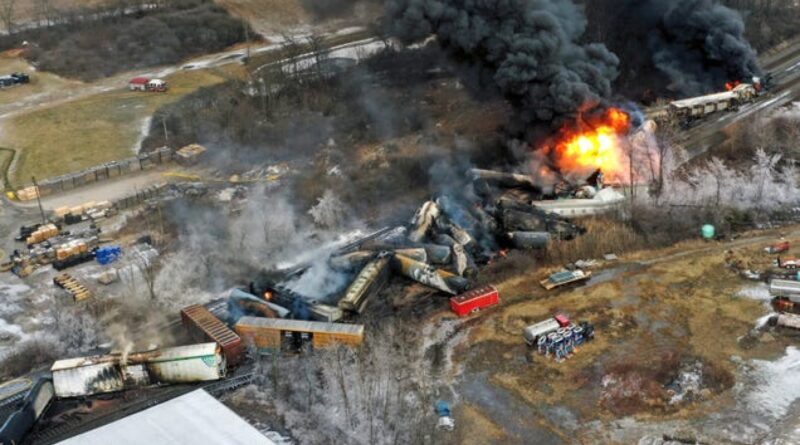Norfolk Southern Violated the Clean Water Act in East Palestine Disaster, DOJ Lawsuit Alleges
Norfolk Southern is facing more fallout over the February 3 derailment of one its trains in East Palestine, Ohio. That disastrous derailment, in which multiple tanker cars carrying hazardous chemicals overturned and spilled, forced the evacuation of thousands of residents of the Ohio town, killed tens of thousands of fish, and left locals concerned over long-term health impacts.
Rail Company Sued For Train Derailment in Ohio | Extreme Earth
Now, the Department of Justice, on behalf of the Environmental Protection Agency, has filed a federal lawsuit against the rail company. The complaint claims that, by spilling the toxic chemicals, Norfolk Southern violated the Clean Water Act. A portion of the vinyl chloride, a plastic precursor being carried by the train, and other hazardous materials leaked into a stream alongside the rail tracks. The controlled burn of the chemicals released additional toxic compounds that also potentially entered waterways.
So far, millions of gallons of wastewater have been removed from the site of the derailment and as part of the ongoing clean-up. Much of that contaminated water has been hauled to hazardous waste storage sites in Ohio and elsewhere, per the Associated Press. In addition to the water removal, federal and state environmental and health officials have also been overseeing continued soil, air, and water testing.
For all of those efforts, the feds want the company responsible to pay up. The suit seeks civil penalties and that Norfolk Southern cover the cost of clean-up, government response, and damage triggered by the accident.
G/O Media may get a commission

42% Off
Amazon Fire TV 50″ 4K Smart TV
Incredible visuals
This smart TV has access to a wide array of streaming services, all of which are easier to navigate, has 4K visuals for a stunning picture, and comes with an Alexa Voice Remote too.
The 1972 Clean Water Act protects waters of the Unites States from pollution. And though the exact meaning of “waters of the United States” has been a topic of a contentious back and forth over the past few decades, the federally protected status of the Ohio River isn’t really up for debate.
From the small stream adjacent to the train tracks, the new lawsuit alleges, toxins resulting from the derailment flowed downstream through a series of ever-larger tributaries to the Ohio River, ultimately contaminating the large, navigable waterway.
Already, Norfolk Southern was facing a lawsuit from the state of Ohio demanding that the freight company take financial responsibility for local clean-up costs and damage. The federal complaint adds to the ultimate cost Norfolk Southern could be forced to pay.
Norfolk Southern executives have repeatedly apologized for what happened in East Palestine, but the troubles have been ongoing for the company’s trains. Between early February and early March, at least four Norfolk Southern trains derailed. On March 9, just hours before a congressional hearing on the Ohio incident, another Norfolk Southern train derailed, this time in Alabama, highlighting just how commonplace such incidents are.
During that congressional hearing, the corporation’s CEO Alan Shaw reiterated to the assembled U.S. senators that he was “deeply sorry” for the damage wrought in East Palestine. He also said he was “determined to make this right.” However, Shaw stopped far short of agreeing to pay for community members’ subsequent medical costs, health care, or local economic damage, according to the New York Times.
The company isn’t the only institution facing criticism over the East Palestine disaster. The EPA itself has been under fire for how it responded to the derailment. Earlier this week, the agency’s watchdog Office of Inspector General launched an internal investigation into how the EPA has handled things.
The East Palestine incident, which has captured national attention thanks in part to shocking images of the aftermath, could ultimately lead to industry-wide changes. On Thursday, six U.S. senators introduced legislation that would tighten safety requirements for freight trains carrying hazardous materials.

